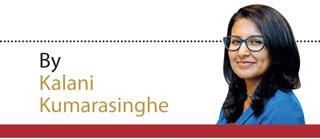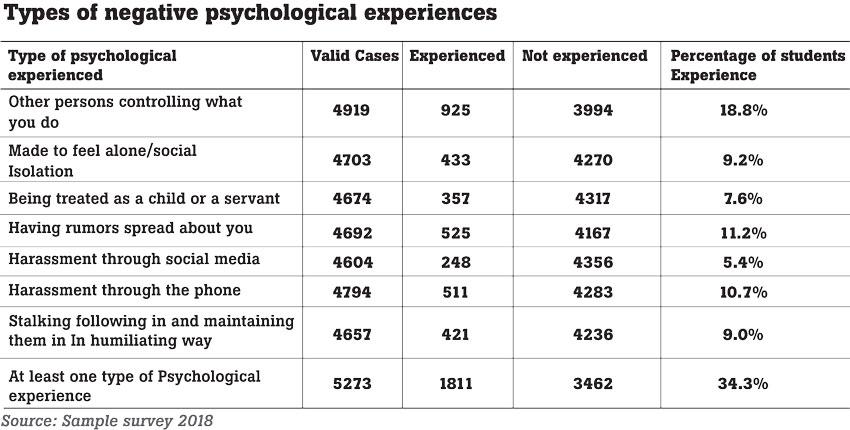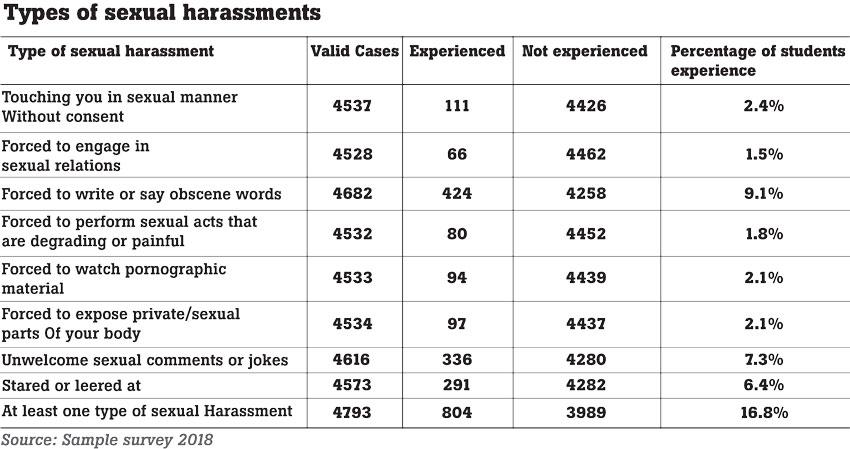24 Mar 2022 - {{hitsCtrl.values.hits}}
16.8% students have experienced at least one type of sexual harassment during the period of ragging
7.3% of these students experienced unwelcome sexual comments or jokes
23.8% of students have experienced at least one type of physical act
 A new study by the Centre for Gender Equity and Equality of the University Grants Commission (UGC), in partnership with UNICEF, found that at least 16.6% students are subjected to sexual harassments, as a result of ragging. The study covered a cross section of state universities, old, new as well as universities located in war-affected areas.
A new study by the Centre for Gender Equity and Equality of the University Grants Commission (UGC), in partnership with UNICEF, found that at least 16.6% students are subjected to sexual harassments, as a result of ragging. The study covered a cross section of state universities, old, new as well as universities located in war-affected areas.
Ragging in universities is usually brought to our attention when either a young life is cut short, or when these shocking acts of abuse are recorded and made public. Unfortunately, it is a form of systemic abuse that has long ailed the public university system of Sri Lanka. Deeply embedded in the university culture and often regarded as a crucial university experience, the act of ragging however has long lasting negative impacts on impressionable
young lives.
Chairman of the University Grants Commission Senior Professor Sampath Amaratunge addressing the launch of the report said that discussions are underway to change the mechanism of lodging complaints pertaining to ragging in universities. He added that Police stations often attempt to resolve the matters amicably, which he believed was an undesired outcome.
“We need students to go to Police stations and lodge entries. Most of the police stations, they try to help each party, to get together and sort out the matter in a friendly manner. This, we don’t want. We want a student to go to a police station and lodge an entry and we want them to go to courts and the matter to be settled at the courts. But most of the time we don’t get that help from other institutions,” Amaratunga said.

“Students won’t go to police stations to lodge their complaints. It’s another issue. So we are concerned of changing the Act (Ragging and Other Forms of Violence in Educational Institutions Act) to see whether university authorities can appear on behalf of the student in a case of ragging. These things are at the discussion stage. In a society, it is a shame to discuss these types of attitudes,” he added. More than half of the students who took part in the study have experienced at least one type of verbal act, such as verbal aggression, shouting, scolding during early days of their university life, the study found. “23.8% of students have experienced at least one type of physical act and some of these physical acts are very harmful and they have been happening in groups. 18.5% students have gone through such experiences,”
researchers said.
“From qualitative insights it was obvious how rigorous and painful they are. For example a fourth year student said that when harsh words were used, it’s mentally depressing. A senior officer from the university said these acts were damaging physically. You have to do pushups in toilets. You have to eat others’ foods. It is unbearable. These were some of the experiences that they had gone through,” they said.

“16.8% students have experienced at least one type of sexual harassment during the period of ragging. 7.3% of these students experienced unwelcome sexual comments or jokes. The number might look small here, but 1.8% students have been forced to perform sexual acts that are damaging and painful,” the researchers shared.
The researchers also explored the difference between the experience of the male and female students. “We wanted to see if there was any difference between males and females in terms of how they experience ragging and gender based violence. Quantitative analysis shows that there is no difference. However the qualitative insights show that the female students see more severity in what they experience than their male counterparts,” they said.

15 May 2024 2 hours ago
15 May 2024 4 hours ago
15 May 2024 5 hours ago
15 May 2024 5 hours ago
15 May 2024 8 hours ago